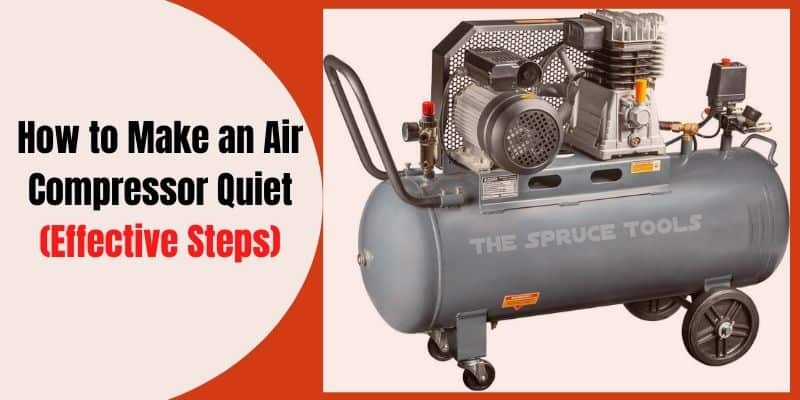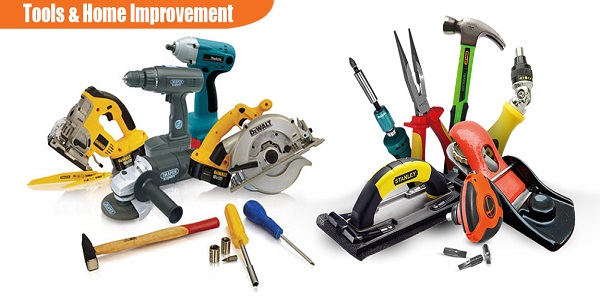An air compressor is a very common piece of equipment in any workshop. It is very crucial when it comes to powering up the nail guns, drills, or any other pneumatic power tools in your workshop. But the annoying problem with air compressors is that they are often noisy. In this article, we will be discussing how to make an air compressor quiet the easy way.

In general, Air compressor makes the most noise without proper insulation. This can severely cost productivity in your workplace and cause problems with your hearing.
To make an air compressor quieter, the first step is to determine what type of air compressor you have and the location of it. The second step would be using a form of insulation for the unit itself, as well as soundproofing material to cover up areas around it.
In a nutshell, that’s how you want to make your air compressor quiet when in operation. But if you want to know more about Air compressor noise and a step by step guide to effectively reduce it; this is the perfect article for you. We have analyzed several methods and finally came up with the solution that works the best.
Let’s not make you wait anymore and dive right into it.
Difference Between Sound and Noise
Air compressors we see in the market have a range of 70-90 dB sound level. DB or A decibel is a measurement of sound that humans can hear. Anything below 75 dB is typically quiet enough it doesn’t hamper Human hearing.
The air compressors having a sound level of more than 80 dB are mostly loud. Because it is hard for a human to tolerate more than 80 dB of sound level for a long time. We also refer to this as noise as it also hinders overall peace around you.
Here is a Noise level chart that shows equivalent instances related to a particular decibel score. This will help you understand how we perceive these sounds around us in real life.
| Noise level | Instance |
| 10 dB | Breathing |
| 20 dB | Whisper, Light snoring |
| 30 dB | Quiet Room |
| 40 dB | Moderate snoring |
| 50 dB | Conversation |
| 60 dB | Busy Street, Alarm Clock |
| 70 dB | Hairdryer, Noisy restaurant |
| 80 dB | Loud radio |
| 90 dB | Bass drum, lawnmower |
| 100 dB | Subway Train |
| 110 dB | Industrial noise |
| 120 dB | Jet Plane take off |
| 130 dB | Gunshot, Metal concert |
Making The Air Compressor Quiet: How to Do It?
So you want to make your air compressor quiet? This has always been a dream for any air compressor owner. Whether it’s a small one or a heavy-duty massive one, noise has been a major problem. After careful testing and consideration, we found these steps are most effective.
The best part is you can implement either one or combine multiple steps to increase the effectiveness. This is perfect if you have a limited budget or surroundings. So choose the steps that make sense to you in your environment.
1. Use Sound Blankets or Wraps
Sound Blankets and wraps are the most affordable way to reduce the noise level. We all must have noticed these sound blankets in concerts, under vehicle hoods, and behind doors. These blankets consist of a thick layer of sound dampener that prevents echo. In some cases, it actually improves sound quality.
These sound blankets are very inexpensive, easy to use, and don’t affect the performance of the air compressor. Just cover the whole air compressor motor with it and it should significantly reduce the noise output.
2. Installing Intake Silencer
Installing a silencer or muffler at the intake is another great way to reduce the noise level. It does require some work that involves some tightening work. But don’t worry; it’s not something you can’t handle with some common tools and a hose.
The device typically comes with an air filter and muffler components inside. Depending on the air intake volume it can be large or small. So be sure to match the silencer with your air compressor intake rating for optimum performance.
3. Putting the Intake of the Compressor Outside
You can also install a long hose to the air intake and keep the other end of the hose outside. It will significantly lower the annoying intake noise from the workshop. You would still hear the motor but it wouldn’t feel as punchy as before when you had the intake inside.
For this method, you need an air hose long enough to take it outside through a window or any kind of vents. And make sure the hose stays nice and straight. Any kind of bending and twisting will prevent smooth airflow to the compressor.
4. Keeping a Certain Distance From the Air Compressor
If the above steps are not enough for you, you can take the entire unit outside of your workshop. If you have a basement, backyard, or isolated places to relocate the air compressor safely, by all means, do that. This method doesn’t need any accessories; you only need to relocate it to a safe place.
However, you still have to make sure your air doesn’t come in contact with rainwater, excessive sunlight, dust, and debris. Also, be careful if it is hindering the peace of your neighbor.
5. Isolating the Compressor Using Rubber Grommets
In machinery, vibrating parts make the most noises. Similarly, the motor in the air compressor is under constant vibration. And this vibration generally resonates throughout the whole body of the air compressor. If you can isolate each component with rubber grommets, you can reduce the overall vibration level and noise along with it.
Rubber grommet works as an isolating washer in all the mounting points. Use rubber grommets in the base of the air compressor, in motor fittings, and so on.
6. Using a Fully Soundproof Box
If any of the solutions doesn’t work well for you, try this for a change. Build an entire box with soundproofing material that can house your air compressor. Beware this can get pretty expensive as you have to build all of those things from scratch. And maintaining it for a long time can also cost you.
When building a box, keep in mind to allocate enough space to fit your air compressor and proper ventilation to exhaust heat. For soundproofing, use thick panels and acoustic foam on the walls. You want all the panels to be as snug as possible to prevent noise leakage.
If all goes right, you may never have to hear any annoying noise from your air compressor again. Just remember to clean the interior once in a while.
See, How to make a soundproof box for air compressor
7. Buying a Quieter Air Compressor
If you don’t want to deal with any of the above situations and have a flexible budget, We think you should go for a quieter one. First of all, it won’t require any sound treatment, and you can work peacefully without any performance hit. This is a solid win for you, your kids, and the neighbors surrounding your house.
Make sure you do thorough research before you purchase an air compressor as it is an investment on your part. It should have the appropriate dimension, performance, and guaranteed noise rating. Always buy from a reputed brand that understands customer value and has a no-nonsense support division for all of your queries.
Best Quiet Air Compressor: California CAT-1P1060S Light and Ultra Quiet.
See more: air compressor for home use.
Causes of Noise in an Air Compressor
It’s really hard to find anyone that hasn’t complained about their noisy air compressor. Unless you have the state-of-the-art silent air compressor, chances are you too have the same problem. So what makes it so annoying? Have you ever wondered why that happens?
Well, in this section we will discuss all the causes that make an air compressor noisy.
Moving Parts
One of the most prominent causes of noise in the air compressor is the moving parts. To be exact, the motor, pulley, drive belt, and the compressor itself in an air compressor makes the majority of the noise. All friction and rapid smashing going on in these components generate loud noises.
Vibration
Another great source of noise would be vibration. All the inner parts in the air compressor are continuously moving at a high speed. That results in various degrees of vibration throughout the air compressor’s body.
If there were any loose parts like bolts, filters, covers, grills, those will vibrate at the same time. Naturally, this vibration will make a rattle noise which can be very loud depending on the intensity.
Intake
An air compressor works just like a vacuum cleaner. It sucks air from the surroundings and pushes down to the cylinder with the help of a compressor. This continuous process is happening so fast it sounds like a vacuum cleaner only a bit louder.
Poop Exhaust System
In some air compressors instead of electric motors, you can see mounted gasoline engines. That engine will make far more noise than an electric one. And due to a poor exhaust system; it doesn’t have much to mitigate such loud exhaust notes.
Quality of Components
Sometimes components in the air compressor can make a lot of difference in the noise department. Low-quality components don’t have the best means to reduce noise as they are so cheap. The manufacturer also doesn’t give much attention as it will increase the unit price. So it is inevitable for cheap air compressors to make a loud noise.
Compressor Type
Depending on the compressor’s type, the level of noise can be different. Generally, Air compressors come with any of these engine types like rotary, reciprocating, centrifugal, and axial. Each type runs on a distinct mechanism that gives off a different sound signature. For example, reciprocating compressors are much louder than rotary compressors.
Wrapping Up
We have tried our best to bring forth all the information we can gather from our experience and all the analysis we have done. So you can understand easily and execute how to make an air compressor quiet? Hope this article helps you and all who need a proper guide in the future.


